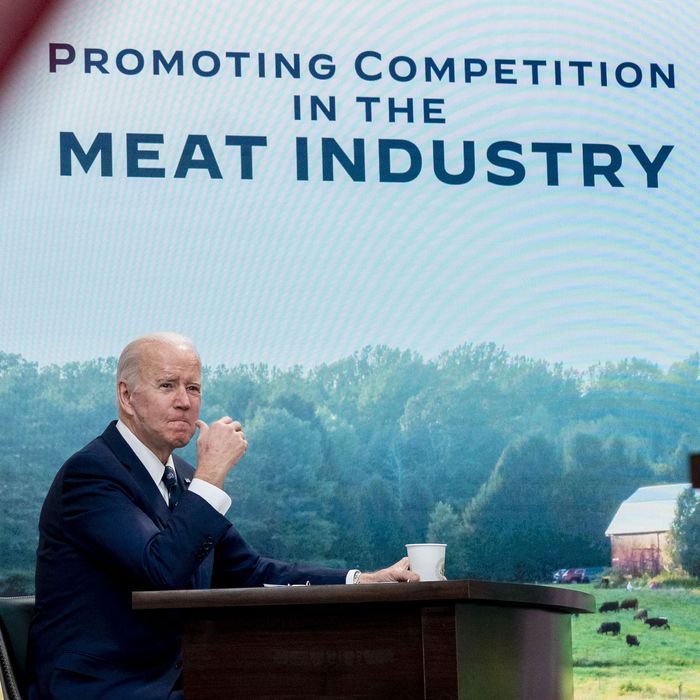
In the olden days — by which I mean 2020 — it might have raised some eyebrows if the president of the United States appeared at a joint event with the attorney general during which the two threatened to break up an industry that was dragging down the administration’s poll numbers.
After all, many liberals excoriated Donald Trump when the Justice Department attempted to block the AT&T–Time Warner merger in 2017 because they believed the president had enlisted the department to punish CNN, owned by Time Warner. And in 2020, House Democrats held a hearing about alleged abuses in the department that focused in part on claims that its Antitrust Division had launched politically motivated investigations into the cannabis and car-manufacturing industries.
A perilously close approximation of these once controversial efforts occurred this month when President Joe Biden appeared at a joint event with Attorney General Merrick Garland to discuss a plan to address the meat-processing industry’s lack of “meaningful competition,” which has supposedly allowed four large companies “to overcharge grocery stores and, ultimately, families.” It was a rhetorical escalation in a monthslong, politically motivated campaign by the White House to blame consolidation in the industry for the cost of groceries, which is at record highs thanks in part to increases in beef, pork, and poultry prices. Among other things, Biden promised that the administration would “enforce existing competition laws vigorously and fairly.” Garland took the opportunity to tout the DOJ’s recent antitrust enforcement work, but more ominously, he also floated concerns about “anti-competitive practices in agriculture” and promised that the department’s “antitrust efforts cannot and will not slow down.”
Garland’s remarks did not attract much scrutiny — perhaps in part because he delivers speeches with all the verve and charisma of a hostage — and there is a long and mostly tolerated tradition of the executive branch selectively (you might say opportunistically) deploying antitrust-enforcement resources in a manner that aligns with its political priorities. But the Biden administration’s reliance on this approach has been far more heavy-handed than usual — and particularly incongruous since it came into office promising a markedly different form of antitrust enforcement.
The Biden presidency was supposed to be the proving ground for a much-touted progressive antitrust-reform movement whose leaders now hold key positions in the administration: Lina Khan, the chair of the Federal Trade Commission; Tim Wu, who works for the White House’s National Economic Council and oversaw Biden’s executive order on competition; and Jonathan Kanter, who in November was confirmed to lead the Antitrust Division. They had criticized decades of antitrust enforcement for focusing too intently on harm to consumers, but the recent campaign to blame big businesses for inflation suddenly has the administration sounding a lot more like the antitrust traditionalists these people were supposed to displace.
Much of the borderline-celebratory coverage last year of Khan, Wu, and Kanter focused on expectations that they would take a more aggressive posture against the country’s biggest tech companies, but it also offered the prospect of a major paradigm shift: a movement away from the emphasis in modern antitrust doctrine on the “consumer welfare” standard. Under that standard, regulators and courts have generally asked whether a business practice — whether it’s a proposed merger or a more discrete transaction — would harm consumers in the form of higher prices, reduced output, or diminished quality. There are a limited number of “per se” antitrust violations that are considered illegal irrespective of their effects, such as bid-rigging, but in practice many antitrust disputes have come down to the question of whether a government intervention is justified because consumers would suffer in the form of higher costs.
Khan, Wu, and other self-styled reformers in this small but suddenly influential contingent argued for years that this approach was both outdated and myopic. Khan called it a “mistake” that had “largely blinded enforcers to many of the harms caused by undue market power, including on workers, suppliers, innovators, and independent entrepreneurs,” and she argued that the law should also protect “small producers from anticompetitive underpayments, preserve open markets, and disperse economic and political power.” For his part, Wu called the consumer-welfare standard “abstract and unmeasurable in practice” and proposed a “protection of competition” standard that would use the law as “an instrument for both the creation of opportunity and the distribution of wealth and power.” Kanter has been purposefully vague but told the Senate during his confirmation process that the consumer-welfare standard has been “inconsistent, vague, and insufficient to keep pace with market realities.”
One particularly unhelpful bit of unsolicited branding cast this as an effort to “make antitrust great again,” but the idea — implied but rarely stated explicitly — was the government might actually intervene in ways that would raise prices for certain goods if, say, benefits would accrue to workers, if it would allow more small businesses to exist, or perhaps if it would “disperse economic and political power,” whatever that might mean. You could see this in the DOJ’s recent lawsuit to block Penguin Random House’s merger with Simon & Schuster, which the department justified in part with the theory that if it went forward, the combination would result in smaller advances for authors.
An economy with high corporate profits and low inflation would have been the ideal environment for the self-styled reform set, but needless to say, that is not how things have shaken out over the past year. Instead, the administration has sought to address the public’s concerns about inflation by invoking the time-honored consumer-cost-reduction goals of antitrust enforcement. Last year, the administration twice asked Khan to examine whether anti-competitive conduct caused an increase in gas prices despite prior inquiries by the agency that failed to link similar increases to illegal conduct. In November, the FTC initiated a study about “the causes behind ongoing supply chain disruptions” in an announcement that implied unlawful “business practices” might have contributed to the problems. The agency directed nine large companies — including Amazon, Walmart, and Procter & Gamble — to produce information about their handling of the issue. Biden pushed the Federal Maritime Commission to investigate price gouging in the shipping industry last year, but it ended up concluding that increases in demand — not illegal conduct — had caused the rising costs for consumer goods.
The administration’s continued castigation of Big Meat seems, improbably, to have pushed some otherwise sympathetic parties over the edge. The Washington Post recently reported that senior officials in the Treasury Department “have been unsettled by the White House’s attempts to blame some large corporations for inflation” and are “skeptical of that explanation for the recent rise in prices”; it cited several other prominent liberal economists — including Larry Summers, Claudia Sahm, Dean Baker, and Jason Furman — who questioned the administration’s claims. A young career staffer joined the public pile-on, and in an unusual alliance, the editorial boards of both the Post (“pinning the current inflation problems on corporate greed is a flimsy argument”) and The Wall Street Journal (“Antitrust has become Team Biden’s household remedy for every economic problem”) have criticized the administration’s approach.
The sweeping legal claims and insinuations are equally dubious. Merely raising prices, however burdensome it may be to consumers, is not illegal (for better or worse, there is no federal price-gouging statute), and neither Biden nor Garland explained how any of the major processors may have otherwise run afoul of the country’s antitrust laws. Those laws generally prohibit conduct that unreasonably “restrains trade” or “monopolizes” markets through anti-competitive conduct, actions that substantially “lessen competition” or “tend to create a monopoly” (most notably, anti-competitive mergers), and “unfair methods of competition” and “unfair or deceptive acts or practices.”
The standards sound broad, but in practice, they are more stringent and harder to establish than they may seem. In recent years, to take one particularly apt example, the DOJ has been conducting a criminal antitrust investigation concerning price-fixing and bid-rigging in the market for broiler chickens. The department secured a corporate guilty plea a year ago, but the effort hit a major stumbling block last month when a judge in Colorado declared a mistrial in the prosecution of ten industry executives after the jury deadlocked following a seven-week trial.
The White House seems to think its decision to enlist the rhetoric of antitrust law in its public rhetoric could be a clever bit of branding that will allow it to leverage public discontent about the economy into support for an antitrust agenda it wanted to pursue anyway. That may turn out to be true, but it is far from clear. There are two other possibilities that have not drawn the attention they should.
One is that economic realities may force the administration to pull back on the ambitions of Khan, Wu, and Kanter, which would not necessarily be as bad as it sounds. The consumer-welfare standard has its problems, but as an intellectual lodestar for enforcement, it is also an underappreciated tool for progressive economic goals, like reducing inequality, that do not require any major changes in the law. An antitrust-enforcement agenda that focuses on goods purchased by people across the income spectrum, like groceries, would have broad and desirable economic effects. There is a reason no one worries much about price-fixing in the market for luxury yachts.
Another, more perilous outcome of the administration’s public push is it could test the patience of many people who were keeping an open mind about antitrust enforcement under Biden. Already, the administration’s first year has provided fodder to those within the business community, among conservatives, and in certain segments of academia who harbored concerns that the people at the helm of the administration’s antitrust efforts were not so much reform-minded heavyweights as pseudo-intellectual partisans. Skeptics may have found further evidence for this view in the nebulous language Khan and Kanter used Tuesday when they announced the start of a process to revise the agencies’ merger-review guidelines — an event at which Kanter referred multiple times to our “multidimensional” economy while stressing the need to avoid the “static formalism” of traditional antitrust analysis. The FTC under Khan recently managed to resuscitate its case against Facebook, but press accounts about Khan’s tenure have featured increasingly conspicuous asides about unhappiness among career staff. Wu and Kanter have so far avoided these charges, but that could easily change. It was also odd, to put it mildly, to see Garland — who has otherwise gone out of his way to avoid any suggestion his work is influenced by the White House — allow himself to be used as a political prop.
Among many antitrust specialists, the view was already that the work of those in the progressive-reform set is standardless and intellectually incoherent, that they pursue companies and industries they hate, like the tech industry, then backfill the legal and intellectual justifications. Those concerns are going to look less and less frivolous if the administration does not pursue an enforcement agenda — a real one using legal tools and the courts rather than the press — that is both coherent and defensible on the merits.






























